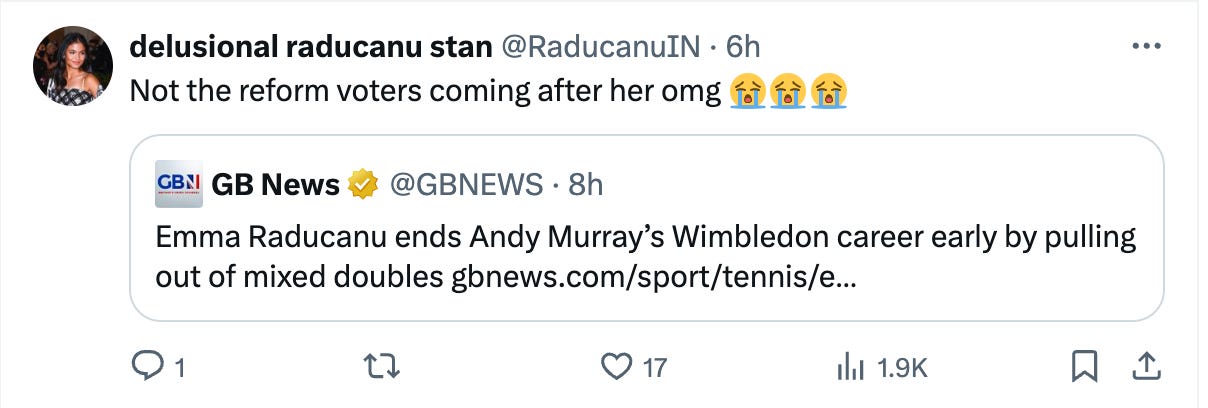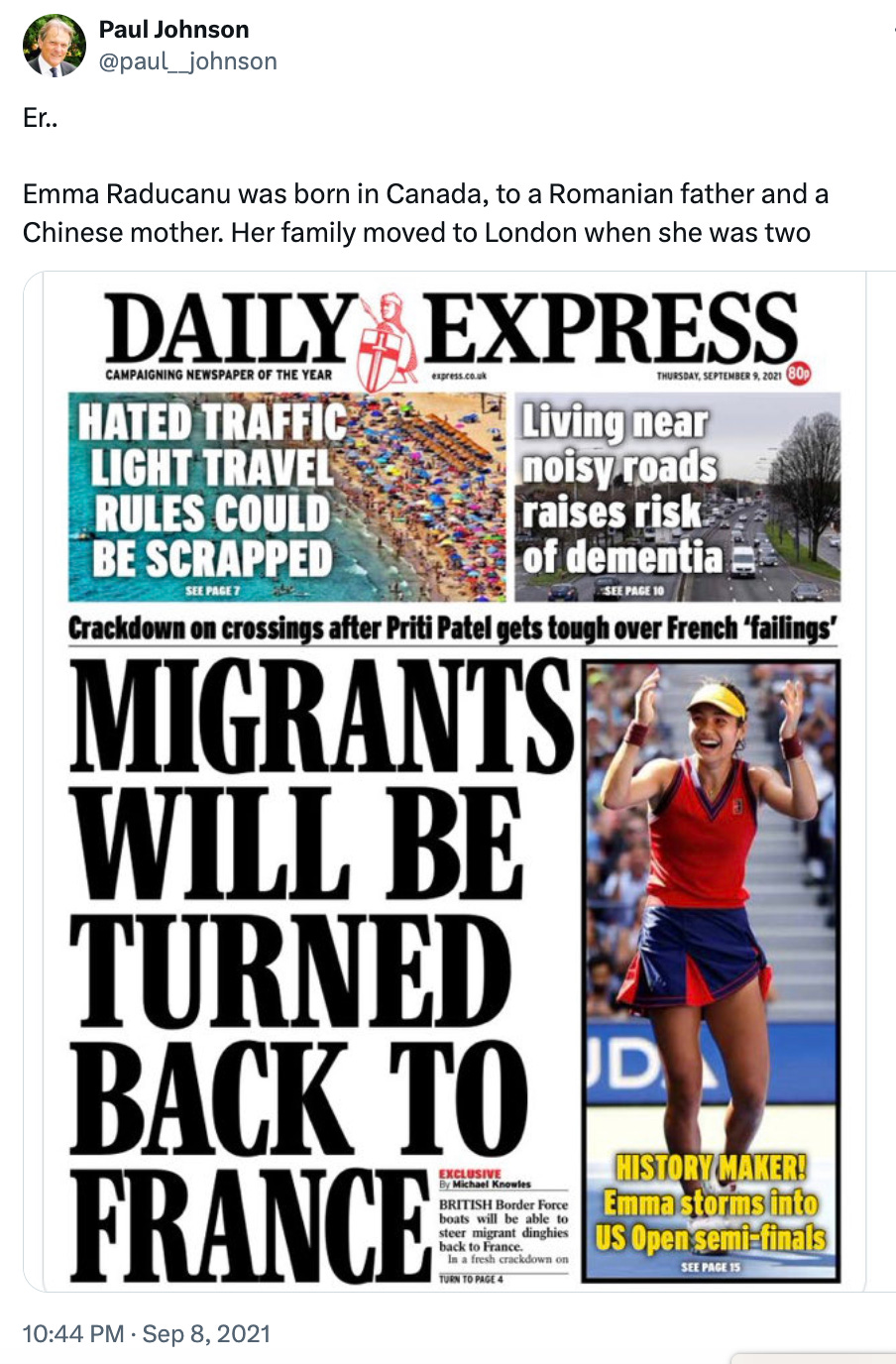The Love and Hate for Emma Raducanu
The last minute withdrawal of Emma Raducanu from the mix doubles with Andy Murray re-inflames torrid commentary aimed at the enigma of British tennis. Why does she elicit such euphoria and opprobrium?
It was all going to be so perfect. Emma Raducanu, the next star of British tennis, enjoying her best run at a Grand Slam since her fairytale U.S. Open title. Then came the announcement that she would accompany Andy Murray on his last hurrah as a “gift” to the Wimbledon public. The pair entering the mixed doubles would be a fun, if bittersweet, send-off for the resilient veteran whose injury-hit late career was sustained by willpower, nostalgia, and, let’s face it, denial. But the time was right. The dream partnership would symbolise Murray’s legacy and further anoint the next object of heightened affection in the rarified peculiarities of Wimbledon.
As a tennis fan, I was looking forward to this as much as anyone who loves the game (and is a Brit). However, the narrative was scuppered by Raducanu’s withdrawal from the match just hours before it was due to start. Citing stiffness in her wrist and a need to prioritize her singles, Murray’s closing evening on the hallowed turf was denied. Cue an eruption of debate and criticism, much of it fitting the pattern of dark and often vicious bile aimed at the 21-year-old that has been an unwelcome accompaniment of her career.
The reporting on the withdrawal was framed in many quarters as though it was Raducanu who had "retired" Andy Murray. There was even some unedifying social media involving Judy Murray commenting on the reaction of one presenter who said he was “astonished” at the withdrawal. This has all been unfortunate, to use a BBC cliché, and probably avoidable. But it made me think about the enigma of Emma Raducanu. Why does she elicit such rapturous exhilaration, yet an animosity bordering on hatred?
The starting point is clearly the U.S. Open victory in 2021. It was a moment of sporting unexpected elation, both in the fact of it happened but its very manner. Coming through three rounds of qualifying, Raducanu proceeded to demolish all opposition in a display of free stroke-making and exuberant movement. I became completely invested in the story. Not merely because this was a British player doing well; my sporting spectatorship is not predicated so much on national tribalism. It was that Raducanu's style and comportment seemed to evoke a kind of purity in the pleasure of watching athletic brilliance.
Maybe it’s too much to suggest that it felt almost transcendent, but in the cynical world of professional sport, Raducanu’s innocent playfulness seemed somehow otherworldly. From a British standpoint, it seemed too good to be true. We are so used to our tennis, and sports stars generally, winning through hard-fought, against-the-odds struggles (see Murray’s entire career), or pluckily falling just short. Raducanu’s major win had no expectation, no anxiety attached to it. And even I type this, the concept seems ridiculous, but as Raducanu proceeded through round it because inevitable she would triumph
Like the other young icon of tennis, Carlos Alcaraz, there is something so natural, unpracticed, almost insouciant about her aura. Watching her fourth-round match just the other day against world number 9, Maria Sakkari, there was a stark contrast between the Greek player’s muscular physicality and the lithe looseness of Raducanu’s fluidity. More than that, it is possible to feel how her exuberant joy in playing was transmuting to the crowd with such symbiosis that the best word to describe it is euphoric.
It goes without saying that for the ravenous British press, this was a huge story. They did what they always do with every young British star, fermenting the adulation and hype along with an almost vampiric level of expectation. Overnight, she was transformed from a promising teenager that only those following tennis quite specifically had heard, of into a symbol, and thus a mediated repository for the nation’s collective hopes and insecurities.
The two years since that Grand Slam victory have been a crucible that has shaped an intriguing narrative around Raducanu. She experienced a series of injuries that clearly gnawed away at her form and confidence. Winning the Open came before she was an established tour player, so her career and ranking were fast-forwarded with no time to adapt to the “grind.” The injury problems culminated in double wrist surgery and foot surgery with significant time out.
She's also cycled through coaches in a manner that seems counter to the premiums of progressive development and stability. The decision to part ways with Andrew Richardson, who guided her to the Major victory, shows a ruthless streak that has continued. Yet the merry-go-round of top coaches coming into and leaving her team has been curious. Clearly, a feature of Raducanu’s approach (and how much her family and inner circle define this) is to go her own way. Not following conventional wisdom is always going to draw criticism. Such autonomy extends to the management of her schedule, with the decision to skip the French Open being one of a string of choices that have been questioned by former pros and pundits.
In thinking about the public sense of Raducanu, another key factor is the multitude of endorsement deals. Post the U.S. Open win, she instantaneously became a marquee name, and associations with blue-chip companies are relentlessly visible. With success, this was always going to be a byproduct. Professional tennis is an expensive life, and to be at the top, players strive for gains with extensive support teams. But with on-court struggles, it’s been an easy if lazy criticism of Raducanu. Every loss instigates the online admonitions to practice more and spend less time making money. Comparisons to Anna Kournikova speak to that oh so British admonition: she’s not working hard enough.
The fact that she won a Grand Slam without the physical solidity required for the grind of the tour is both a testament to her talent and a cruel irony. The expectations placed upon her are not just high; they are Sisyphean, an endless mountain of pressure that must be scaled repeatedly. There have been times when it looks like the pointlessness of the struggle is etched on her face. In one press-conference in particular she even offered possible regret at winning the U.S. Open.
In many ways, Raducanu is just one in a long illustrious list of sports stars who have been built up and knocked down. It’s a national pastime. This latest “drama” in the tennis ecosystem is playing out in parallel with the England football team’s Euro campaign, and its cocktail of joy and vitriol. Anything short of victory for either will be deemed a failure by a public and media that oscillate between love and hate with dizzying speed. The asperity for both is often delivered through the acrid spittle of cultural animosity, revealing the hypocrisy of Britain’s sense of its own identity.
It’s clear there is a gender element here also. For many, usually men, the very thought of a successful (in talent and money) young woman, particularly in sports, taps into a sense of unfulfilled entitlement. And while I’m not one for reducing all ills to the advent of social media, that there is a mechanism to aim misogynistic ire directly at the target with a chance it will get them, offers a kind of illusory yet performative power, buttressed by the digital mob and individual anonymity.
Furthermore Raducanu’s instantaneous arrival into public consciousness and the subsequent scrutiny she endured, in face of not living to “perfection”, speaks to the ephemeral nature of modern fame and the impossible standards we set for those who capture the public's imagination. Along with having to bear the complexities and contradictions of British projects of selfhood, not to mention the unadulterated venom of simple envy.
I’m sitting down now to watch her next match at the this year’s Wimbledon. She plays a qualifier Lulu Sun with who there are some strange parallels. Both players embody a multicultural heritage, Sun was born in New Zealand, to a Croatian father and a Chinese mother, Raducanu has Romanian Chinese parents. The pressure will all be on Raducanu as the draw suggests she can at least get to the semi-final. I doubt there will be any direct backlash from a crowd who, like me, are there hoping to imbibe a little of that sporting euphoria. One can only hope that the last 24 hours have not affected her focus, or more importantly that sense of joy and freedom that seems to fuel her best tennis. If she loses, unfortunately the armchair judges will doubtless reemerge in all their snotty putrescence. When a star has given a taste of perfection, anything else is a betrayal.








